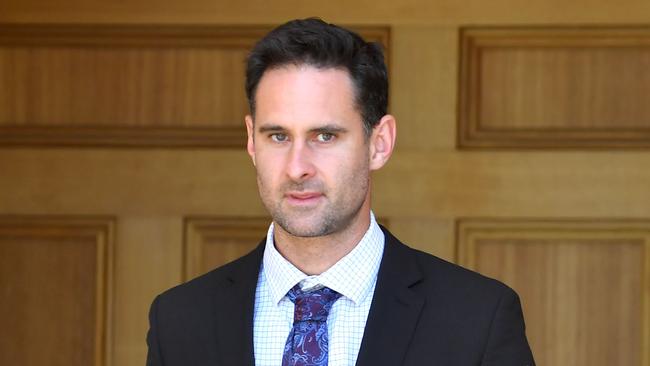Adelaide lawyer Andrew Robert Graham pleads guilty on the first day of his trial for supplying cocaine and trying to bribe a security guard
This Adelaide lawyer has avoided a trial and admitted supplying cocaine in a nightclub and trying to bribe a security guard – but only after hours of negotiations between top SA legal minds.

Police & Courts
Don't miss out on the headlines from Police & Courts. Followed categories will be added to My News.
- How to get the most out of your Advertiser digital subscription
- Adelaide lawyer facing serious charges over nightclub cocaine ‘bust’
An Adelaide criminal lawyer known for representing bikies has admitted supplying cocaine to another person in a nightclub – and trying to bribe a security guard to look the other way.
After four hours of negotiation involving some of SA’s top legal minds, Andrew Robert Graham opted on Thursday to plead guilty rather than stand trial.
Both his personal liberty and, potentially, his future career prospects now rest in the hands of District Court Chief Judge Michael Evans.
Graham, 36, of Vale Park, had previously pleaded guilty to one count of administering a controlled drug to another person.
That early plea earned him, under state law, a discount on his sentence of up to 40 per cent.
At the same time, he pleaded not guilty to one count of attempting to pervert the course of justice.
Both charges arise from an alleged incident in a city nightclub in August 2019.
At Graham’s first court appearance, SA Police alleged he supplied cocaine to others and consumed it himself at an unnamed nightclub while under surveillance by a security guard.
They alleged that, when confronted, Graham attempted to persuade the security guard not to take any action over the incident.
On Thursday, Marie Shaw QC, for Graham, said her client’s case had been expedited to the District Court by way of an “ex officio” information.
She asked for time to negotiate with prosecutor Jim Pearce QC, saying that fast-tracked approach might, under state law, negate the sentencing discount earned by her client.
Four hours later, Ms Shaw told Chief Judge Evans the matter “had resolved” and that a trial would no longer be necessary.
“We will be putting a submission to Your Honour as to how this matter should proceed, and the prosecution will not object to that submission,” she said.
She suggested a means by which the case could proceed within the confines of legislation but without Graham losing his discount.
Mr Pearce said the court should “proceed as the defence has outlined”.
“If problems arise, we will cross that bridge when we need to and address them then,” he said.
Chief Judge Evans agreed, but expressed concern.
“I caution counsel that I remain concerned I will find myself bound by the legislation in regard to sentencing reductions,” he said.
“I do just caution you but, as long as everyone is going into this with their eyes open, I’m prepared to proceed in this way.”
He remanded Graham on continuing bail to face sentencing submissions in August.
Graham declined to comment outside court.

